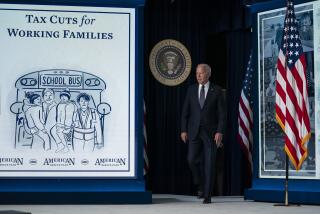Tax credit draws scrutiny
This year’s $8,000 federal tax credit for first-time home buyers has attracted as many as 90,000 ineligible claimants -- including a 4-year-old child -- raising questions about efforts to extend the popular program.
In all, tax credit claims totaling more than $600 million are suspicious, tax officials testified Thursday before Congress.
The credit, on home sales to first-time buyers that close through Nov. 30, is an important piece of the $787-billion stimulus package enacted in February and is part of the Obama administration’s effort to lift housing sales.
The housing industry has been pushing to extend the credit or even expand it to include more home buyers to keep momentum going in the nascent recovery of home sales and prices.
But the White House, eyeing the estimated $1-billion monthly cost, has been less eager.
“Based on the administration of the credit today, I am very concerned about the IRS’s ability to effectively administer the credits that are claimed before the Dec. 1 deadline, let alone any credits that may be claimed within future extended deadlines,” Treasury Inspector General J. Russell George testified before the House Ways and Means Oversight subcommittee.
The tax credit goes to buyers who had not owned a primary residence in the last three years and earned less than $75,000 as an individual or less than $150,000 as a married couple.
But through late August, more than 19,000 taxpayers had listed the credit for properties that hadn’t been purchased, filing claims worth nearly $140 million, George said. Nearly 74,000, claiming nearly $504 million, appeared to have already owned a home, he said.
An additional 582 supposed first-time home buyers turned out to be younger than 18 years old, claiming nearly $4 million.
Although officials said some circumstances would allow minors to purchase a home, most of the suspicious cases seemed to involve parents pulling the strings because their own incomes were too high.
George said more than 3,200 taxpayers claimed nearly $21 million through tax returns filed with individual taxpayer identification numbers, often used by nonresident aliens, who are excluded from the program.
Several Internal Revenue Service employees were among the taxpayers who wrongly claimed the credit, he said.
Meanwhile, 48,580 taxpayers still working with the less-generous 2008 version of the credit may have claimed less than they were entitled to.
In direct response to Thursday’s testimony, subcommittee Chairman John Lewis (D-Georgia) introduced legislation that would boost the minimum age of credit seekers to 18 and require claimants to include documents proving their eligibility.
The quick implementation of the tax credit program caused the IRS to process more than 1 million returns before new fraud filters were in place, he said.
“This tax credit is an important resource for families seeking to purchase a home and a vital part of our economic recovery efforts,” Lewis said in a statement. “We must ensure that we are administering the credit accurately and strike a balance between issuing timely refunds of the credit and protecting federal resources.”
The IRS has so far discovered 167 criminal schemes, opened 115 criminal investigations and temporarily frozen more than 110,000 refunds.
Some cases, officials said, could reveal innocent errors, but the agency has already agreed to the inspector general’s recommendations to take corrective action.
“The IRS recognized that there is potential for both fraud and error whenever a new refundable tax credit, like the first time home buyers, is enacted,” testified Linda Stiff, the agency’s deputy commissioner for enforcement. “We cannot let fraudulent activity undermine a program that has benefited so many.”
Through late August, more than 1.4 million claims have been made for the home buyer’s credit, with hundreds of thousands more expected when tax returns are filed in 2010. Lewis estimated that Americans, 60% of them with incomes below $50,000, will end up claiming around $18 billion in tax credits.
Despite the potential for scams, some lawmakers want to broaden the credit further.
Sen. Johnny Isakson (R-Georgia) hopes to introduce legislation that, by doubling the income limits and pushing the deadline to late June, would open the program to more than just first-time home purchasers, appealing to buyers who want to trade in their starter property for something better.
An extension would cost roughly $1 billion a month, according to congressional estimates.
Rep. Xavier Becerra (D-Calif.), a member of the committee, said that despite the program’s faults, the credit still had healthy support and would be improved before being extended.
“We need to inject, in prudent ways, some stimulus,” he said. “We sense that the housing market still has a way to go before it recovers, and this is a direct way to help regular people instead of the banks and mortgage brokers.”
Housing officials wondered whether that expense might end up outweighing the boost to the housing market.
Shaun Donovan, secretary of the Department of Housing and Urban Development, said Tuesday in a Senate hearing that although the program’s benefits were clear, he doubted that home sales would suffer a “catastrophic decline” if the credit expired on schedule.
But the recent “glimmers of a bright future” could quickly fade without an expanded credit as the fragile market heads into its traditional slow season, said the National Assn. of Realtors.
“The data on the present home buyer tax credit show that the credit has had its intended impact,” Ron Phipps, a vice president for the trade group, said earlier this week.
“Without congressional action now, the market and our national economy may freeze again -- possibly as soon as this month.”
--
More to Read
Inside the business of entertainment
The Wide Shot brings you news, analysis and insights on everything from streaming wars to production — and what it all means for the future.
You may occasionally receive promotional content from the Los Angeles Times.











